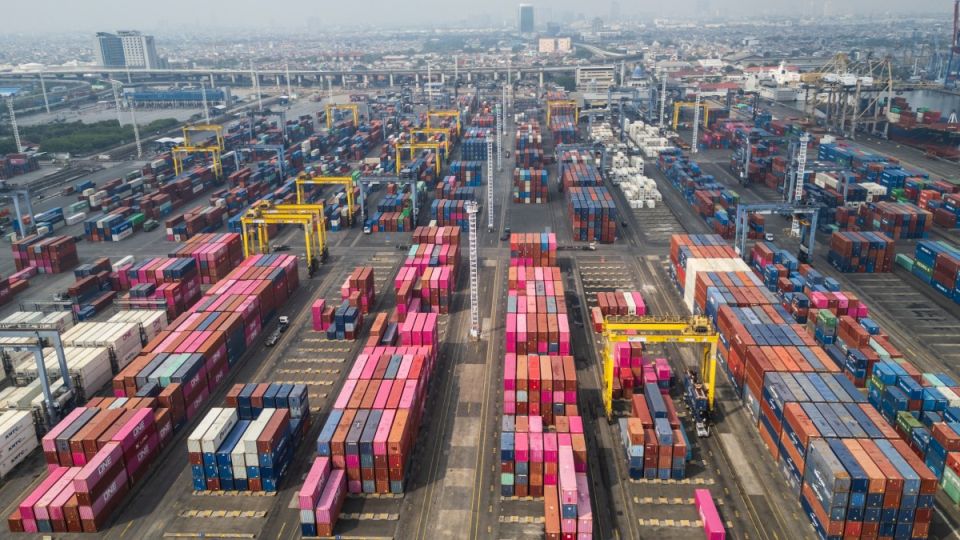October 10, 2025
JAKARTA – Industry players have warned that Indonesia’s export reputation is on the line, as delays in addressing recent radioactive and toxic material contamination could undermine the credibility of local goods abroad. They cautioned that such fallout could lead to financial losses and mass layoffs, urging the government to act swiftly and implement stronger safeguards to prevent future incidents.
The Indonesian Employers Association (Apindo) has called for urgent measures to restore global market confidence and prevent stigma on Indonesian goods surfacing, as negative perceptions toward one export commodity can spill over to related industries.
“Such reputational risks can also affect other sectors such as fisheries, processed foods and agribusiness […] impacting Indonesia’s exports as a whole,” Apindo’s head of the fisheries and livestock division, Hendra Sugandhi, told The Jakarta Post on Tuesday.
Hendra noted that the recall of Indonesian shrimp exports to the United States by the US Food and Drug Administration (FDA) has prompted many foreign buyers to be more cautious, tightening inspections or even delaying contracts with local suppliers.
He emphasized that recent contamination cases must be handled promptly and transparently through proper recalls and investigations into the root-causes, while ensuring that businesses adhering to safety standards are not unfairly penalized.
“A thorough investigation from upstream to downstream must be carried out by the government or competent authorities responsible for the case, ensuring effective corrective actions to prevent the same problem from recurring,” he said.
Shrimp Club Indonesia (SCI) chairman Andi Tamsil revealed that around 400 containers had been returned so far, representing a loss of over Rp 1 trillion (US$60 million), with many other buyers reportedly postponing purchases. He added that shrimp farms in various regions have suffered price drops of up to 30 percent.
“[This incident] has hurt more than 600 small-scale farmers in Aceh, North Sumatra, West Sumatra and surrounding areas,” Andi told the Post on Wednesday.
He explained that farms suffering such losses are now unable to pay workers or purchase raw materials such as shrimp larvae and feed, creating cash flow strain across the entire supply chain.
“The entire shrimp industry employs over 1 million workers. So far, layoffs have already occurred at PT Bahari Makmur Sejahtera (BMS) [whose goods were recalled by the FDA over radioactive contamination], affecting approximately 7,000 employees. If purchase delays continue, other exporters could soon be affected as well,” Andi claimed.
Outside the US, he said that importers from several other countries, including China and European Union markets, had contacted Indonesian authorities seeking clarification regarding the radioactive contamination.
Local sales, meanwhile, cannot absorb the excess supply amid the export downturn, according to Andi. Domestic demand is estimated at only 15,000 tonnes per year, compared to 270,000 to 280,000 tonnes exported annually.
Read also: Govt rushes to clean up cesium-137 spill in Banten
Indonesia’s food export industry has faced a series of contamination cases in recent months, spanning various commodities from shrimp and spices to instant noodles. The incidents have drawn heightened scrutiny from key markets toward the “Made in Indonesia” brand.
In August, the US FDA detected traces of cesium-137 (Cs-137), a radioactive isotope, in a container linked to BMS’ facilities in Cikande, Banten. Investigations later revealed contamination at a nearby scrap metal facility, PT Peter Metal Technology, located roughly two kilometers away.
Authorities have not yet made a direct connection between the findings, but nine residents of the area tested positive for internal radiation exposure through whole body counter (WBC) detection in late September.
Soon after the shrimp case, another controversy emerged involving one of Indonesia’s most iconic export products. On Sept. 9, the Taiwan FDA pulled an Indomie instant noodle variant, Soto Banjar Limau Kuit, after detecting ethylene oxide, a carcinogenic chemical.
The instant noodle producer, PT Indofood CBP Sukses Makmur (ICBP), admitted that the product tested in Taiwan failed to meet local standards but said it was not officially exported, blaming unauthorized importers for the shipment.
With the shrimp case still unresolved, another radioactive contamination issue surfaced in September, when the FDA detected traces of Cs-137 in a clove sample from Indonesia supplied by PT Natural Java Spice. As a result, the company’s spice products were added to the FDA’s import alert list for suspected chemical contamination.
Read also: US FDA slaps new requirements on RI shrimp, spices after radioactive contamination
These cases have hampered the rising performance of the affected commodities.
Over the past five years, Indonesia’s shrimp exports have been valued at between $1.7 billion to $2.2 billion.
According to data from the Maritime Affairs and Fisheries Ministry (KKP), in the first half of 2024, Indonesia’s shrimp exports to the US accounted for 63.2 percent of total exports, valued at $477.29 million.
Meanwhile, Indonesia’s exports of cloves (including whole fruit, stems and buds) to the US reached $12.57 million in 2024, reflecting renewed demand for the product.


